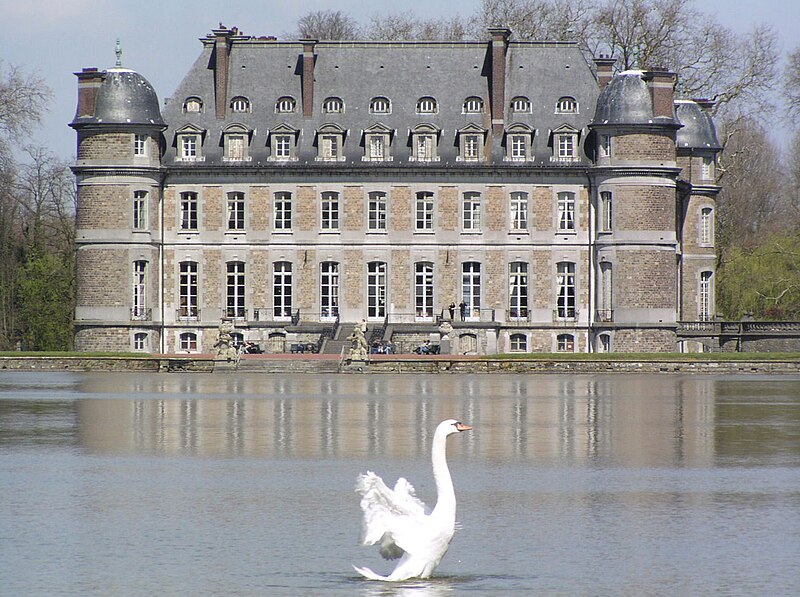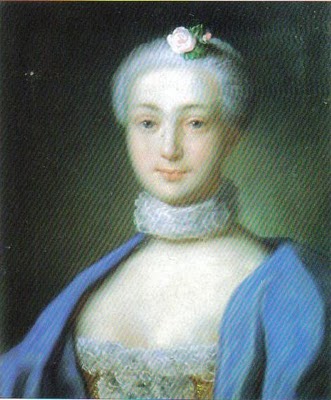Belgian soldier, writer, playwright & diplomat.
7th Prince de Ligne 1766; Prince of the HRE; Prince d'Amblise; Prince d'Epinoy; Comte de Fauquemberg; Comte de Nichin; Vicomte de Leyden; Sovereign de Fagnolle; Premier noble of Flanders; Grandee of Spain; Field Marshal 1809; Captain of the Trabant Guards 1806.
Husband of: Franziska von Liechtenstein (1739-1821)
"Charles Joseph, Prince de Ligne, who was born at Brussels in 1735, was descended from a family celebrated in the history of the Netherlands for several centuries. He entered the army in 1752, and made his first campaign in 1757. In 1758 he was engaged at the victory of Hochkirchen, and gained the rank of colonel on the field of battle. He was made a major-general at the coronation of Joseph II, and he had the honour to accompany that sovereign on his interview with Frederick II in 1776. In the following year he was promoted to the rank of lieutenant-general. In the conclusion of peace he returned to France. His amiable character and chivalrous manners rendered him a great favourite at Versailles, where he had already made a distinguished figure in 1759. Queen Marie Antoinette received him with marked condescension. At Versailles he became acquainted with the Marchioness de Coigny, to whom he addressed, from the banks of the Boristhenes, the most remarkable portion of his correspondence. When he was sent to Russia, in 1782, his talent and fine person distinguished him among the courtiers of the Empress Catherine. She made him a field-marshal, and permitted him to accompany her on her journey to the Crimea. Joseph II having conferred upon him the rank of general of artillery, he joined Prince Potemkin, who was then besieging Oczakow. In the following year he took command of a corps of the Austrian army, and shared with Laudon the glory of taking Belgrade. This was the close of his military career. The revolution of the Netherlands deprived him of his property; a misfortune which he bore with most philosophic fortitude. The Emperor Francis made him a captain of the Trabans in 1807, and a marshal in 1808, and he always presided at the council of the order of Maria Theresa. In the latter part of his life he devoted himself entirely to literary occupation. His collected works are published in thirty volumes. Many of them have attained considerable celebrity, particularly those in which he describes the events of which he was a witness, and the distinguished individuals he intimately knew." (Journal of a Nobleman: 10)
"Charles-Joseph, Prince de Ligne, Austrian General and French literateur, was born in Brussels in 1735, and died at Vienna in 1814. He was a son of Prince Claude Lamoral de Ligne and Elizabeth de Salm-Salm. The Prince de Ligne left many printed and manuscript works. Madame de Stael said of the Prince de Ligne: 'He is the only foreigner who, in French manners, has become a model insted of being an imitator.'" (Souvenirs of Madame Vigée Le Brun: 50)
A vigorous heterosexual from age 16 to 74.
"Soldier, published writer, playwright, wit, devoted to excess, described by Goethe as 'the most cheerful man in Europe.' Born in Brussels, the only son of the impossibly wealthy Hainaut family of landowners. He felt himself to be European, rather than belonging to any particular state and mixed conviviality with monarchs across Europe. On of the commotion around the death of Louis XV he wrote to Voltaire 'it was raining bishops and enemas'. A defender of homosexuality he himself led a vigorously heterosexual life from the age of 16 to at least 74 (when he fathered an illegitimate child), seducing women irrespective of rank or nationality. He was opposed to anti-semitism, and, well in advance of his times, he declared the injustice of a wife's property belonging to her husband. A dull acquaintance, approaching de Ligne yawning was told 'my dear Count, you forestall me'. The is a biography by Philip Mansel, 'Prince of Europe: the Life of Charles Joseph de Ligne' (Weidenfeld)." (Brussels Remembers)
"Prince Charles-Joseph de Ligne has two paradoxical reputations of being both famous and little known. Most studies of the eighteenth century mention him, at least in passing, as one who was acquainted with Louis XV and Louis XVI, Marie Antoinette and Madame du Barry, Maria Theresa of Austria and Catherine the Great of Russia, Potemkin and Loudon, Joseph II, Casanova, Goethe, Madame de Stael, Voltaire and Rousseau, Talleyrand, Friedrich the Great, and many others. He was a grand aristocrat, a talented military man, an entertaining writer, a brilliant conversationalist, a great garden fancier, a moralist and a memoirist. He witnessed the fall of Napoleon, who fascinated him but whom he refused to meet." (Wilnitsky)
"Charles de Ligne, Prince of Areberg (1550-1616), the highest-ranking nobleman of the Southern Netherlands after the ruling prince, had a passionate interest in plants and animals since his youth, but was involved for most of his life in military campaigns, politics and diplomacy. In 1605 he retired to Enghien (also known as Edingen) southwest of Brussels, where he bought the castle and part and devoted himself entirely to collecting plants and other naturalia. Together with his wife Anne de Croy, the rich Duchess of Aerschot, who wa also the sister of the Prince of Croy to whom Peiresc gave the pink flamingoes, de Ligne turned the grounds at Enghien from a neglected domain into one of the most beautiful gardens of Europe. During the last years of the 16th century moreover, Arenberg had also acquired the famous Libri Picturati collection -- the watercolours of plants and animals commissioned by Charles de Saint Omer some thirty years earlier. The contents of Arenberg's library, which contained most of the great botanical works of the 16th century, plus his personal contacts with Clusius further demonstrate his wide-ranging and expert interest in naturalia." (Luxury in the Low Countries: Miscellaneous Reflections on Netherlandish Material Culture, 1500 to the Present: 60)
Prince de Ligne's full titles.
" . . . His own style and titles in full were as follows: Charles-Joseph, Prince de Ligne, d'Amblise, and the Holy Empire, Marquis de Roubais and de Dormans, Comte de Fauquemberghe, Baron de Werchin, Beloeil, Antoing, Cisoing, Villiers, Silly, and Herzelles, Souverain de Fagnolles, Seigneur de Baudour, Wallincourt, and other places, Chevalier of the Golden Fleece, Commander of the Order of Maria Theresa, Grandee of Spain of the first-class, first Ber of Flanders, peer, Seneschal of Hainault, Field-Marshal of the Imperial armies, captain of Trabans, colonel-proprietor of the Wallon infantry regiment, Saxe-Gotha, and chamberlain of their Imperial Majesties." (The Prince de Ligne: His Memoirs, Letters, and Miscellaneous Papers: 174)
 |
| Castle of Beloeil |
His lovers were:
1) Adelaide Fleury
2) Adelaide Nones.
1) Adelaide Fleury
2) Adelaide Nones.
Natural offspring:
1. Christine de Ligne (1788-1867)
2. Adele de Ligne (1809-1810)
3) Albertine-Elisabeth de Nyvenheim, Marquise de Champcenetz
1. Christine de Ligne (1788-1867)
2. Adele de Ligne (1809-1810)
3) Albertine-Elisabeth de Nyvenheim, Marquise de Champcenetz
 |
| Angelique d'Hannetaire by G.-L. Godecharle |
4) Angelique d'Hannetaire (1749-1822)
French actress & opera singer
a.k.a. Marie-Angelique Servandoni.
5) Christine de Ligne (1788-1867)
6) Maria Wilhelmina von Neipperg, Princess von Auersperg (1738-1775)


No comments:
Post a Comment